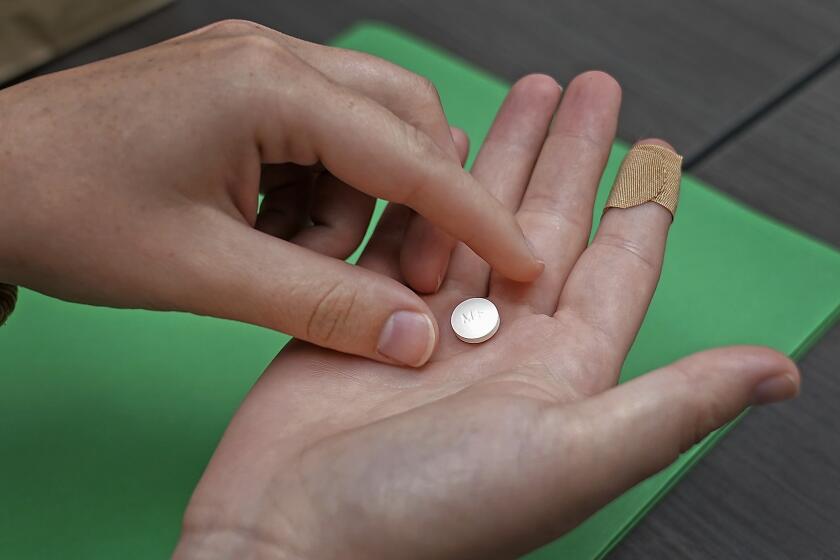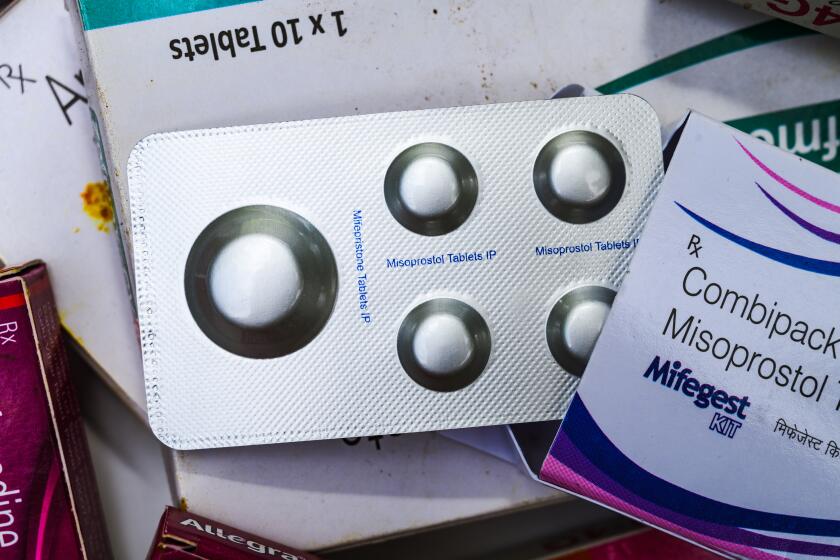Opinion: What antiabortion activists want next

- Share via
The state of Texas filed a major lawsuit on Dec. 12 against a New York doctor who mailed abortion pills to a Collin County, Texas, woman, arguing that the doctor was practicing medicine without a Texas license and violating the state’s abortion ban. The suit raises messy legal questions about whether one state can haul a doctor abiding by the law in another state into its courts, or enforce a judgment if it wins. More than that, however, the suit is a window into the next battlefield over abortion rights — and how abortion pills and telemedicine are reshaping the politics of abortion in America.
The antiabortion movement’s endgame is establishing fetal personhood — the idea that life and constitutional rights begin at the moment sperm fertilizes an egg. Fetal personhood was referenced in the 2024 GOP platform and embraced in a strategy endorsed by most leading antiabortion groups. It has been a focal point of the movement’s efforts for 50 years.
Texas is suing a New York doctor for providing abortion medications to one of its residents. It marks a new front in the war over access to reproductive care, one that California will soon be dragged into.
But with blue states and many red states reaffirming a right to abortion, fetal personhood doesn’t seem like it’s going to come to pass anytime soon. In the meantime, abortion opponents have set their sights on shutting down access to abortion pills — mifepristone and misoprostol. The Supreme Court rebuffed one Texas lawsuit targeting mifepristone in June (on the basis of standing), but as the new case indicates, that hasn’t discouraged the antiabortion movement.
Here’s why: Medication abortion, also called chemical abortion, has made it difficult to enforce abortion bans in the states where they exist — indeed, even with Roe vs. Wade reversed, studies show an increase in the number of abortions performed annually in the U.S. Abortion pills also make it harder to frighten doctors and harder to stigmatize the termination of pregnancy.
Americans in an array of states sent a message to the incoming Trump administration and other elected officials: They won’t give up autonomy over their bodies.
When all abortions were surgical, the procedure had to take place in bricks-and-mortar facilities. The clinics became targets for protest and sometimes violence and vandalism. Abortion pills, however, can be prescribed remotely, through a telehealth consultation, and they are taken at home very early in a pregnancy. Pills make abortion more private, distancing patients from clinic protests, and their effects may resemble miscarriage, which already occurs in up to 20% of known pregnancies — so much so that physicians have no reliable way of telling the symptoms apart. Along with backlash against the reversal of Roe, the nature of medication abortion seems to be reshaping how Americans think about terminating a pregnancy: The number of those who see abortion as a moral decision has increased in recent years.
The Texas lawsuit is part of a much broader antiabortion strategy that will unfold in the new year. Besides targeting telemedicine and pills, antiabortion groups plan to pursue anyone who aids or abets abortion — for example, internet service providers that allow websites to provide information about abortion pills and where to get them. Other proposals copy a Louisiana law that designates safe and effective drugs used in abortion as “controlled substances.”
Mifepristone has been used more than 5 million times in the U.S. since its FDA approval in 2000. The Supreme Court will weigh a challenge to expanding its access.
In addition to these maneuvers, look for abortion opponents to lobby the Trump administration to reinterpret the Comstock Act, a 19th century obscenity law, to make it illegal to send anything used in abortions by mail. That could create the equivalent of a nationwide ban, which Congress so far won’t legislate and voters don’t want.
And there are other steps the Trump administration could take that would dramatically change abortion access. In 2023, the Food and Drug Administration made changes to the restrictions governing mifepristone and telemedicine abortion appointments. Ever since, antiabortion groups have developed a grab-bag of arguments against the FDA’s rules. They argue that the consensus of peer-reviewed studies is wrong and that mifepristone is extremely dangerous. They also have argued that mifepristone and fetal “remains” are an environmental hazard polluting groundwater.
Democrats should repeal the Comstock Act, an 1873 law that conservatives want to use to prohibit any shipment of the drugs used for medically induced abortions.
Robert F. Kennedy Jr., who would have oversight of the FDA if he is confirmed as Trump’s pick to be secretary of the Department of Health and Human Services, said he was pro-choice on the campaign trail, but he also has signaled openness to the antiabortion movement. Claims about drug safety and environmental hazards might resonate with Kennedy, who is an opponent of Big Pharma and once worked in environmental law.
The Supreme Court decision overturning Roe has done nothing to end abortion battles; instead, it has given them new life. Fights over telemedicine consultations, mail-order access to abortion pills and FDA safety rules could make abortion bans far more effective, reshape the procedure in states that protect abortion rights and expand the power of one state to dictate policy in another.
Most important: If abortion opponents succeed in making abortion pills inaccessible, the stigma surrounding abortion may well increase, and access to the procedure decrease. That’s why antiabortion groups have been relentless in their pursuit of pills. Nothing less than Americans’ view of abortion itself is on the line.
Mary Ziegler is a law professor at UC Davis. Her latest book, “Personhood: The New Civil War over Reproduction,” is scheduled for publication in April.
More to Read
A cure for the common opinion
Get thought-provoking perspectives with our weekly newsletter.
You may occasionally receive promotional content from the Los Angeles Times.














